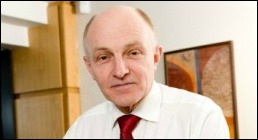Taking one small step to a more equal society

Chief Commissioner Dr Michael Wardlow reflects on 2017 and looks at how we can become a more equal society.
I have a number of lasting memories from last year, the most embedded one of which is the families fleeing from the mayhem at the Ariana Grande concert where 22 died and 500 were injured. This was one of four terror attacks last year in the UK - as I recall vividly the terror delivered on Westminster Bridge, London Bridge and Finsbury Park Mosque.
This inability to tolerate “the other” led to 58 being murdered in a Las Vegas night club and over 300 being slaughtered in an Egyptian mosque bombing in November.
In the rest of the year we saw the growing migrant crisis and the emerging Rohingya catastrophe.
The Harvey Weinstein affair reminded us that sexual harassment at work remains a major issue, in fact complaints to the Commission have increasd by nearly a third in five years. Sexual harassment does not only happen in the entertainments industry or Parliament – it also happens in fast food outlets, care homes, service stations, phone shops, corner shops, banks and laboratories here in Northern Ireland.
Closer to home we saw Article 50 triggered in March and had an unexpected election in May, which left a government in crisis.
Here, in this place we call home, race hate incidents continued unabated and so called “punishment attacks” remain a part of our weekly news digest. Continued budget cuts and sustained austerity measures added to increasing poverty will continue to be the backdrop against which we will try to build our shared society in 2018.
Those observations made, I believe there is reason for hope and not despair. Why? Because many people are unhappy with where we find ourselves and want change. There is strong evidence of support for increased legal protection for those most marginalised – those of different race, abilities and sexual orientation than the majority population. Younger members of our society tend to have a more liberal attitude to difference than their parents and grandparents. Civil society is becoming increasingly mobilised with Health workers giving up their holidays at a time of crisis in the service.
The Commission has been consistent in expressing our concern about the impact of the economic downturn and reducing public expenditure on equality. We are also consistent in stressing that addressing inequalities was and is essential to creating and maintaining the conditions for peace in Northern Ireland. I recognise that the journey towards a more fair and equal society remains a long and complicated one. Many people still face discrimination despite the fact that some of our anti-discrimination laws, covering gender and religion and politics have been in place for 40 years. We need a shift in attitudes if real change is to come. We need champions of equality, new voices to emerge to take up the challenge.
Change requires a personal commitment on all of us to take one small step, to be a creator and not a consumer of this new, shared society. As a Commission we will continue to raise awareness of the protections available to everyone and challenge discriminatory practice where we encounter it. Your accompaniment along the way would be warmly welcomed.
Posted on 04 Jan 2018 by
Dr Michael Wardlow